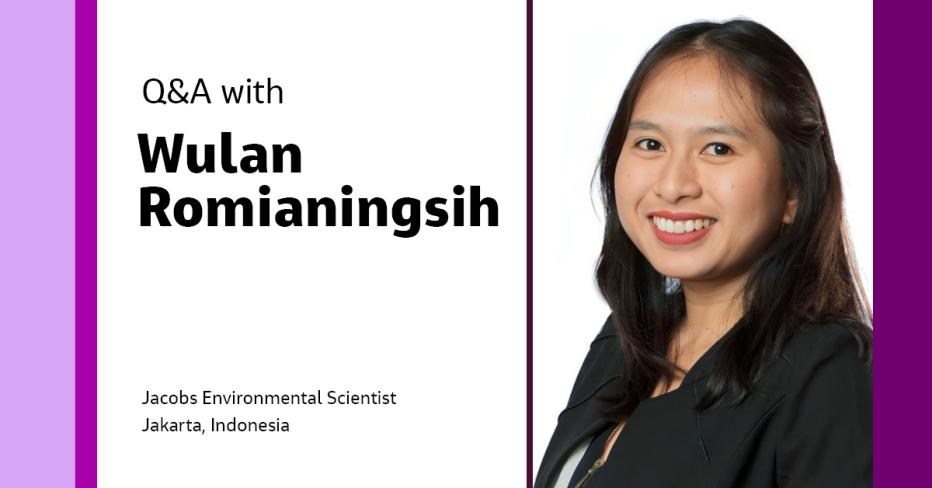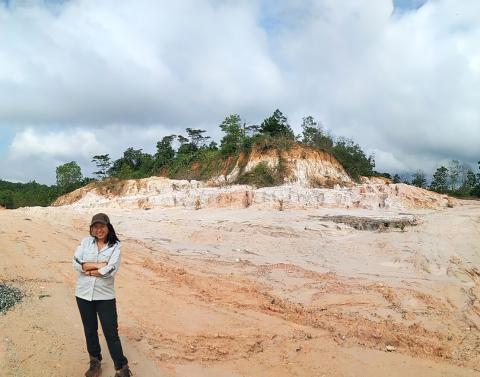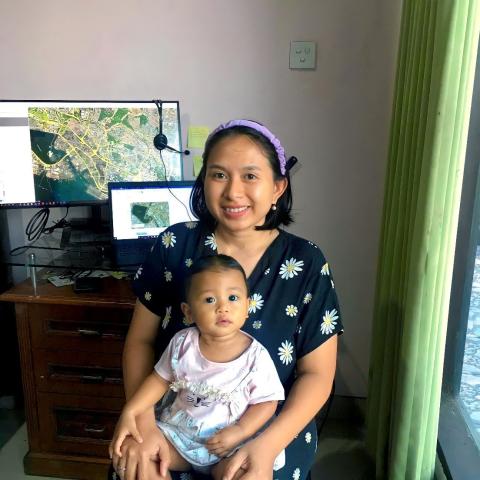
Extreme weather events, polar ice cap melts, wildfires and droughts — the effects of climate change have become more frequent and more intense today, impacting the environment, economies and societies around the globe. Decarbonization has an important role to play in mitigating climate change.
Jacobs’ Environmental Scientist, Wulan Romianingsih, is helping our clients in Asia explore decarbonization solutions from energy transition to nature-based solutions and is now working with our data center clients on carbon abatement projects.
Let’s get to know Wulan and her thoughts on realizing a low-carbon future:
Demands for data and digital transformation are key factors behind data center energy consumption. As data center capacity increases, so will energy consumption. So, what can we do to change the trajectory, and how can data centers leave a greener footprint?
Investors and customers globally have been putting pressure on data center companies to minimize their carbon footprint. In response to these market demands and to boost competitiveness, we are seeing data center companies investing in green solutions. My recent research on data center sustainability trends shows that energy efficiency, green buildings and renewable energy sourcing are the top environmental priorities of data center companies. Be it global or local players, they’re investing in design, technology and people to achieve their green targets.
Frankly speaking, we’re on the right track and what’s important is continuously monitoring the efforts to achieve green targets.
Can you tell us a bit about your role and what are you most passionate about?
I’m an environmental scientist by training. During my first two years with Jacobs, I did a little bit of everything, such as environmental impact assessment, environmental compliance monitoring, multidisciplinary due diligence and Environmental, Social and Governance (ESG) review. Recently, I’ve taken on a new challenge of working on decarbonization projects and I’m really enjoying it.
I’m a lifelong learner, thus, passionate about learning new things. Thanks to my role, I have endless opportunities to learn from our team and clients.
Tell us more about your career background. What sparked your interest in a STEAM career in decarbonization?
I started my environmental career at a non-profit organization, running a small mangrove and coral reef conservation project as well as an environmental awareness campaign at schools. Honestly, I had never dreamt of working in the engineering field until I joined Jacobs. My interest grew as I began my new role and was assigned to multiple projects, including decarbonization. I’m fascinated by how diverse and complex this field is and I’m proud that I can contribute to a greater good through my role.
What do you think are the biggest challenges facing global decarbonization efforts?
It depends on the sector. For data centers, to be specific, based on my experience one of the challenges is to reduce Scope 3 emissions. Scope 3 are indirect greenhouse gas emissions from upstream and downstream supply chain activities, for instance, purchased goods and services, employee commuting, waste generated during operation and embodied carbon from data center construction. Reducing Scope 3 emissions is a complicated process and achieving it clearly requires collaboration with contractors and suppliers. Another challenge is transitioning to low-carbon backup power, such as hydrogen fuel cell. Since this is a nascent technology, the infrastructure and policy around it are very limited at the moment. This will require significant innovation, investment and cooperation among governments, data center companies and energy companies as suppliers.
Can you tell us a bit more about the decarbonization solutions and projects that address some of our market challenges?
Our team offers various solutions from energy transition to nature-based solutions, all tailored to clients’ decarbonization goals.
We recently completed a low-carbon energy study for a data center client in Singapore. With this client, we explored multiple options for a clean energy pathway across a broad range of technologies and supply routes, such as hydrogen for power generation, carbon capture, utilization and storage (CCUS), hydro, solar photovoltaic (PV), and geothermal and developed a decarbonization map accordingly. I would say this project is unique, given that Singapore doesn’t have major renewable energy sources and nearly 95% of its power is generated from imported natural gas.
We’re now assisting another data center client in replacing its diesel generator with hydrogen fuel cells or reciprocating engines. Our services range from creating a roadmap to a feasibility study of hydrogen-based concept design to deliver a low-emissions solution for backup power across its facilities in Asia, Africa, Europe and North America.
“Decarbonization opens countless opportunities for our sectors, for instance, using cleaner energy, improving energy efficiency, green buildings, sustainable sourcing, and many more - all achievable through technology and system innovation.”
Where do you think the greatest opportunity lies in relation to decarbonizing our sectors?
Decarbonization represents a fundamental transition to a low-carbon economy to meet our Paris Agreement objectives. It opens countless opportunities for our sectors, for instance, using cleaner energy, improving energy efficiency, green buildings, sustainable sourcing, and many more - all achievable through technology and system innovation.
People would be surprised to know that …
I was once a part-time chemistry teacher! Teaching taught me to be versatile and always have a backup idea in my emergency kit. Being a teacher also taught me to recognize and celebrate wins — no matter how small.
-

This picture was taken before the COVID-19 outbreak when Wulan was supervising our subcontractor on environmental sampling and social survey in Sumatra Island for periodical reporting to lenders and the local environmental agency.
-

Wulan loves the fact that she can work flexibly at Jacobs. She is still getting used to working from home with her supportive co-worker, her one-year-old daughter.
What’s something you learned in the last week?
Plenty! I learned how to make kaasstengels and pineapple tart and learned how to stimulate my daughter to talk.
I’m doing my thesis research and thus constantly exploring the environmental permitting aspects in Indonesia. I also re-learned some essential excel formulas.
Proudest career moment?
When I changed my career and joined Jacobs in 2019. It was a challenging and risky decision as I had no consulting background and had to relocate from Bali to Jakarta, leaving behind my parents and dogs. Looking back, I’m proud of my decision and have no regrets!
When you’re not at work, you enjoy…
Cooking and playing Pokémon Go - these two are my ultimate stress reliever. I also love traveling with my friends and family.
What do you enjoy most about being part of #OurJacobs?
Firstly, I get to work with talented, passionate and caring people who help me grow professionally. Secondly, I have the opportunity to be part of a diverse team working toward the same purpose, to build a more connected and sustainable world.
About the interviewee

Wulan Romianingsih has a master’s degree in environmental science from the University of Indonesia. As an environmental scientist at Jacobs, she offers tailored solutions from energy transition to nature-based solutions to clients in Asia. Recently, she has been working with our data center clients on carbon abatement projects.
Join #OurJacobs team
What drives you drives us as we work to build a better world – together. At Jacobs, every day is an opportunity to make the world better, more connected, more sustainable. We’re always looking for dynamic and engaged people to join our team. Bring your passion, your ingenuity and your vision.













































